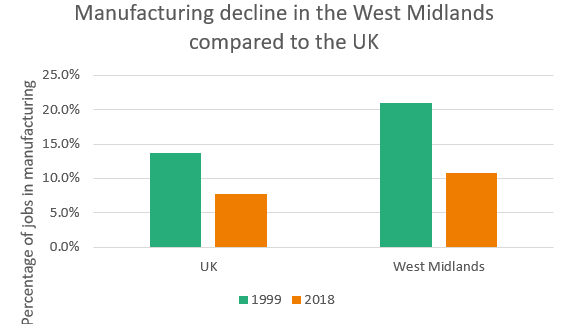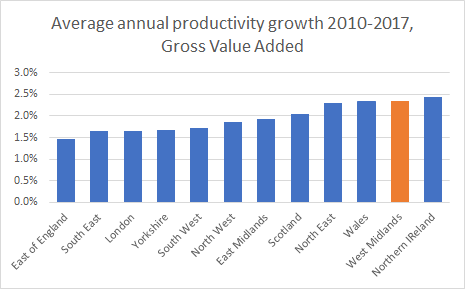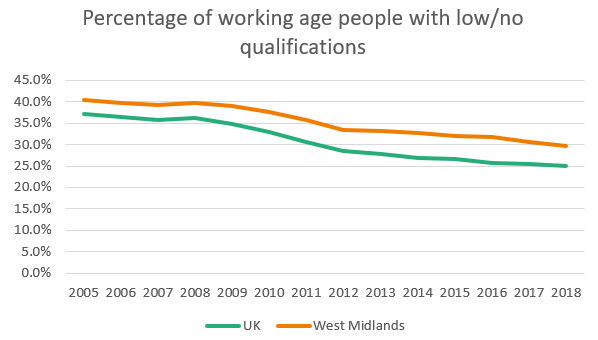REGIONAL ANALYSIS: West Midlands
Article
This analysis was handed out at our event Economic Justice for the West Midlands. The event was the West Midlands instalment in a UK-wide series of public meetings held by the IPPR Centre for Economic Justice.
Decline in manufacturing - Manufacturing jobs in the West Midlands have fallen by over 230,000 over the past 20 years, moving from 1 in 5 workers in 1999 to 1 in 10 workers today. This reflects a wider decline in UK manufacturing – but the fall in the West Midlands was particularly large, with 1 in 6 manufacturing job losses in the UK being accounted for in the West Midlands over this period.1

Source: IPPR analysis of workforce by industry (SIC 2007) (ONS)
Despite this, the value of goods exported per working age person is the highest of anywhere in the UK at over £9,000.2

Source: IPPR analysis using Regional and sub-regional productivity in the UK (ONS)
This will partially explain the region’s above average pay growth, which has risen by 2.1% a year on average since 2010, slightly above the UK average. Despite promising growth, IPPR analysis estimates that 27% of jobs in the West Midlands are paid less than the Real Living Wage, set at £9 an hour outside of London.
Qualifications - The West Midlands has the highest proportion of people with low or no qualifications of any region or nation. In 2018, 3 in 10 had low or no qualifications in the West Midlands compared to 2 in 10 in the South East, the best-performing region.
Despite improvements over time, the gap has widened with the rest of the UK. In 2005, working age people in the West Midlands were 9% more likely to have no or low qualifications than working age people across the UK, compared to being 18% more likely in 2018.

Source: IPPR analysis using Annual Population Survey (ONS). Low/no qualifications defined as less than NVQ L2
This suggests that workers in the West Midlands will be less able to access higher skilled and better paid jobs than the average worker in the UK and that this situation may be worsening over time.
References
1. IPPR analysis using Workforce jobs by industry (SIC 2007) (ONS)
2. IPPR analysis using UK imports and exports by region (UKTradeInfo) and population estimates by age (ONS)
Related items

Will technology reduce the cost of delivering public services?
This is the third in a series of blogs related to IPPR Scotland’s project on ‘Employment, Productivity and Reform in the Scottish Public Sector’ funded by the Robertson Trust.
The full-speed economy: Does running a hotter economy benefit workers?
How a slightly hotter economy might be able to boost future growth.
Making the most of it: Unitarisation, hyperlocal democratic renewal and community empowerment
Local government reorganisation need not result in a weakening of democracy at the local level.